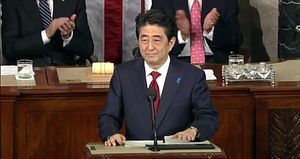Japanese Prime Minister Shinzo Abe seems determined to push through a national security in agenda that would put to end Japan’s post-war pacifism, at least in the form that Japan’s citizens have come to know it. Despite the best efforts of Abe and his colleagues in the Liberal Democratic Party (LDP), Japan’s public and opposition legislators are determined not to let Japan’s constitutionally enshrined pacifism go gentle into that good night. Last week’s crucial vote in the House of Representatives–the lower house of Japan’s bicameral legislature–revealed the deep fissures in Japan around Abe’s national security agenda. The legislative package passed, but at great cost–protest and opposition uproar reached unseen peaks.
A casualty of Abe’s determination to get this package of 11 security-related bills through both houses of the Diet could be nothing less than the very fabric of the U.S.-Japan alliance. Observers stateside have admired Abe’s impulse to rearrange the burdens of the alliances by letting Japan play a more active role. Abe’s dynamism has taken this alliance to a tipping point unlike one seen since Japanese Prime Minister Zenko Suzuki and U.S. President Ronald Reagan laid out the contours of the “sword and shield” alliance that stood largely unchanged for nearly three decades. (Yasuhiro Nakasone later would utter the words “unsinkable aircraft carrier” as a characterization of Japan’s islands as immutable foundations of American power projection in the Pacific.)
What Abe (and the broader LDP-Komeito coalition) seem not to have fully considered is the longer term effects of pushing through constitutionally dubious legislation on broader Japanese public opinion toward the United States and the U.S.-Japan alliance. Abe, as prime minister, should first be concerned with his duty to the Japanese people as his constituents, but he seems to be equally (if not more) concerned with his “constituents” in the United States.
Remember, in April, as the first Japanese prime minister to ever address a joint session of U.S. Congress, Abe effectively promised that he would recalibrate Japan’s national security agenda to live up to the commitments set out in the revised U.S.-Japan defense guidelines. He told U.S. legislators that his coalition was “determined to enact all necessary bills by this coming summer.” He went on to emphasize how this would enable Japan’s ability to make a “proactive contribution to peace based on the principle of international cooperation.”
Since then, the domestic debate in Japan predictably spiraled into accusations that Abe undercut the authority of Japan’s legislature when he publicly committed reform to the United States (other commentators, including here at The Diplomat, have covered those conversations in greater detail). As Yuki Tatsumi noted astutely last week, the debate in Japan has largely focused on the constitutionality of the reforms. Abe and the LDP have bought into that debate without an attempt to shift the conversation into a serious assessment of whether the reforms would bolster Japan’s national security.
The events of July 16 represent a high-water mark for Abe. They may presage the beginning of the end for the relative complacency with which Abe has pursued heavy-handed defense form. After all, with Yoshihiko Noda’s exit in late 2012, it appeared that a new era of uncontested LDP dominance had returned, benefiting Abe’s grand plans for Japan’s defense posture. As the debate leading up to the lower house’s adoption of the national security package showed, Japan’s jumbled opposition parties–the Democratic Party of Japan, Japan Communist Party, People’s Life Party, Social Democratic Party, and even the Japan Innovation Party–are forming a bulwark against reforms that may well be unconstitutional.
The upper house now has 57 days to consider the legislation package before it votes. The next two months or so will be an important period politically in Japan. If Abe can weather the opposition’s onslaught and the gathering storm of public opinion, we may, in fact, be witnessing the end of the beginning of Abe’s broader plans for Japan. Somewhat fittingly, this issue is coming to a head as East Asia prepares to commemorate the 70th anniversary of the end of the Second World War in Asia. Indeed, the much anticipated “Abe Statement” will be viewed across the region in the context of the domestic situation in Japan.
The days leading up to the House of Councilors’ vote, as well as the outcome of the vote itself, will determine Abe’s prospects as prime minister, the LDP’s enduring popularity, as well as the broader direction of the U.S.-Japan alliance. If Abe succeeds with reform, he and his partners will eye the broader objective of constitutional reform (which, as I’ve noted before, is no simple task, especially without LDP-Komeito control over the upper house).
Crucially, what Abe has failed to manage during his bid to recalibrate Japan’s defense policy is public opinion. It does not bode well for the LDP’s longer term plan that approval rating for Abe’s cabinet fell to an all-time low following the vote on July 16. The LDP-Komeito coalition, with a majority in both houses, does not seem concerned about the scenario where defense reforms pass, bolstering the U.S.-Japan alliance, but result in a Japanese public deeply resentful of Japan’s new role within that alliance.
Will that cost be worth the reward of a ‘normal’ and ‘proactive’ Japan? Abe seems to think so now. In the coming months, he’ll have to decide whether to double down on his efforts despite the intensifying blow-back, or take a step back and reevaluate his own approach. I am not confident that he will opt for the latter.

































